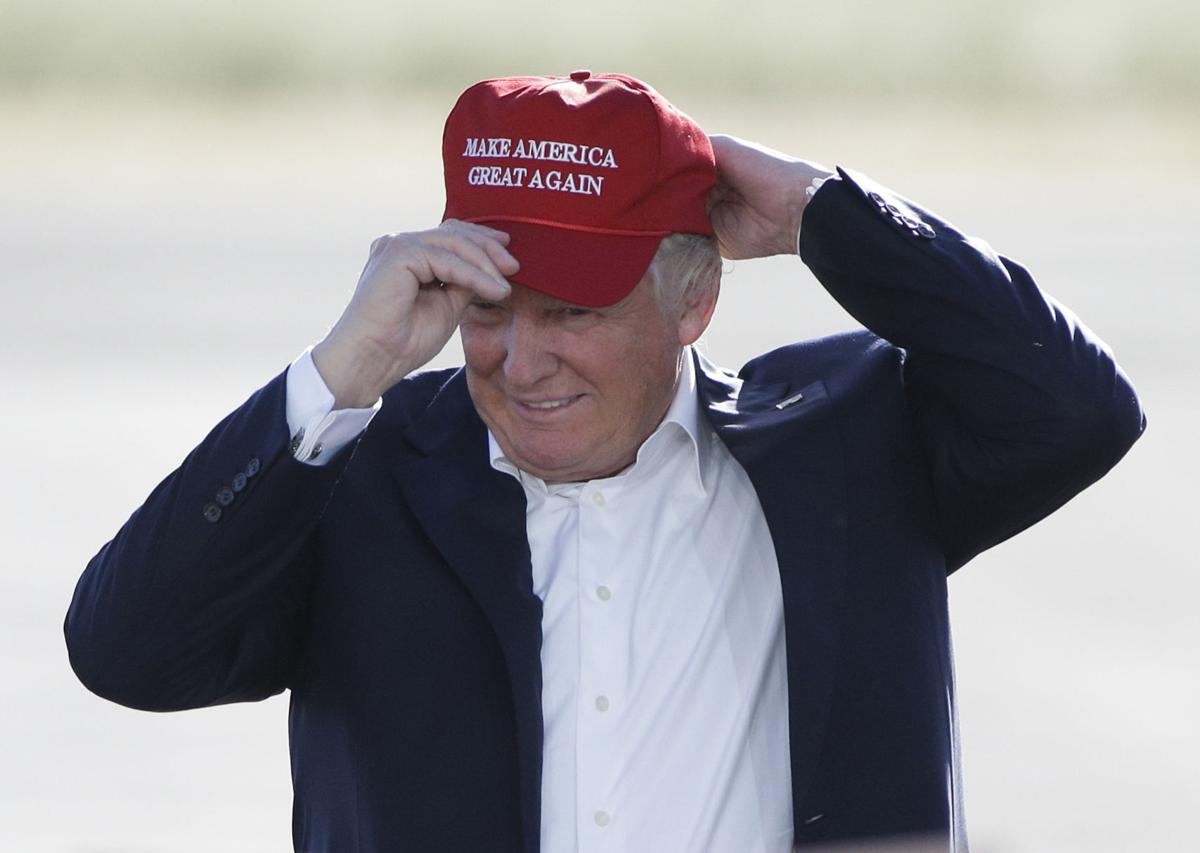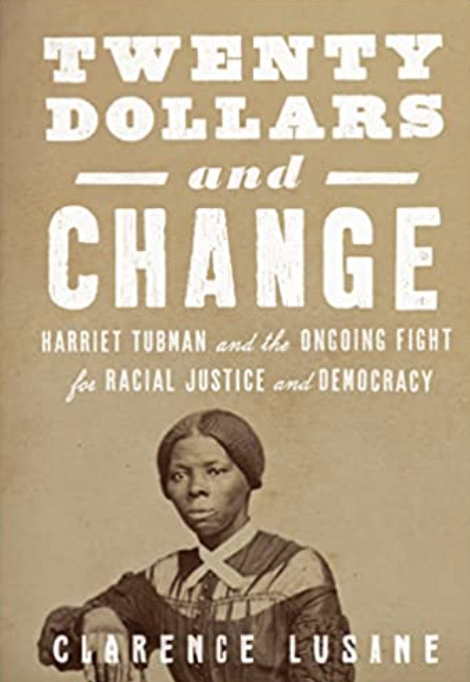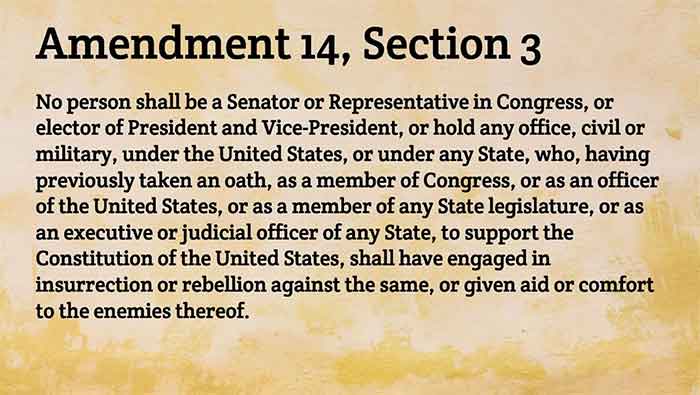
In 2020, The Daily Show ran a segment in which statements by Republican leaders, including Donald Trump, Representative Marjorie Taylor Greene (R-GA), Senator Ted Cruz (R-TX), and various Fox News personalities were juxtaposed with those made by Ku Klux Klan leaders like former Grand Wizard David Duke and former Imperial Wizard Bill Wilkerson. Fired Fox News commentator Tucker Carson, for instance, screeches manically that, because of immigration, “eventually there will be no more native-born Americans.” Immediately following that comment comes former Grand Wizard Duke saying, “We’ve got to start protecting our race.”
Donald Trump is then shown at a rally (with several Black people behind him wearing “Blacks for Trump” T-shirts) saying about Covid treatments, “If you’re white, you have to go to the back of the line. Discriminating against white people!” Again, there’s a cut to Duke stating, “There is racial discrimination going on right now in this country against massive numbers of white Americans.”
All too sadly, it didn’t take much effort then, nor would it now, to demonstrate that the racist “great replacement theory” that contends white Americans are being radically displaced by immigrants underlies an ever-fiercer defense of so-called Christian nationalist identity. And in our time, that defense has been essential to the rise of what has become the Trumpublican Party and the fierce growth of white racism that’s gone with it.
That Daily Show segment ended with the ultimate irony of Ted Cruz claiming that “the Democrats are the party of the Ku Klux Klan.”
No surprise there. Despite the all-too-obvious convergence of the perspectives of the Republican far right and the white supremacists of the Klan, as well as other avowed racists, Republican party leaders continue to vehemently deny any identification with the KKK or its views. In the process, they regularly issue obligatory statements rejecting bigotry, racism, and anti-semitism, while passionately disavowing Duke and others like him — all disingenuous and empty gestures of the first order.
Recent Republican behavior paints a very different picture. Earlier this year, for instance, Senator Tommy Tuberville (R-AL) got thoroughly twisted in knots trying to defend his statement that “my opinion of a white nationalist, if somebody wants to call them a white nationalist, to me, is an American.” Eventually, he had little choice but to (largely) retreat from that stance — at least officially.
Typically though, whatever they may claim, Representatives Greene and Paul Gosar (R-AZ) had no problem hanging out with racists and neo-Nazis — until, at least, they got caught doing so. In February 2022, they both spoke at the America First Political Action Conference that brought together Islamophobes, hardline nativists, and others on the far right. The gathering was organized by prominent white nationalist and Holocaust denier Nick Fuentes.
Yeah, the very same Fuentes who would have dinner with Donald Trump and Kanye “Ye” West at Mar-a-Lago that November.
Like Trump after that feast, when busted, Greene stated, “I do not know Nick Fuentes. I have never heard him speak. I have never seen a video. I do not know what his views are, so I am not aligned with anything that is controversial.” Despite Trump’s dubious assertation that he didn’t know Fuentes either, he certainly knew his old pal Ye and the controversies generated by a number of his antisemitic statements.
Endorsed by Duke
In 2021, it was Gosar and Greene along with Representatives Matt Gaetz (R-FL) and Louie Gohmert (R-TX) who attempted to launch an America First Caucus that would champion “uniquely Anglo-Saxon political traditions.” A secret paper, uncovered by Punchbowl News, discussed the forming of that caucus and the rationale behind it (addressing the supposed threat of “mass immigration” to “the long-term existential future of America as a unique country with a unique culture and a unique identity”). No need even to say “white,” of course. After the document was revealed and some Republican leaders criticized the initiative, all parties involved backed down (at least in public).
Time after time, key Republican figures have leaned into the ethos and ideological aims of white nationalism. It’s no wonder that America’s racists, including the KKK, have fallen in love with the modern Trumpublican version of the Republican Party. Once upon a time, of course, and for decades thereafter, the Klan was deeply linked to the southern wing of the Democratic Party — the Dixiecrats, as they were then known — but began to switch to the GOP as presidential candidate Barry Goldwater and then presidents Richard Nixon (with his infamous “southern strategy”) and Ronald Reagan exploited white feelings of resentment towards the Civil Rights Movement and the national Democratic Party’s support for racial equality.
In a research paper published by the American Sociological Review, David Cunningham, Justin Farrell, and Rory McVeigh argue that the Klan played a small but meaningful role in the transition of the Democratic South from blue to red. In a number of areas, there was a correlation between the rise of Klan activity and the southern shift to the Republican Party.
It should be noted that, from 1989 to 1992, David Duke even served as a Republican in the Louisiana state legislature. Like most white southerners then, he had been a registered Democrat until, in the late 1980s, he joined a regional shift to the GOP. National party leaders did denounce Duke, but local Republicans were far more ambiguous in their dealings with him. He also ran for the U.S. Senate as a Republican and for president in the 1988 campaign, first on the Democratic and then the Populist Party line. That year, he formally switched to the Republican Party, clearly showing which party at any moment best reflected his white nationalist ideology.
The day after Donald Trump accepted the Republican nomination for president in 2016, Duke announced a run for the Senate in Louisiana, saying, “I believe my time has come. The people of this country, the patriotic, decent, God-fearing people of this country are now right with me.” He promptly also backed Trump, claiming that voting for anyone but him for president would be “treason to your heritage.” And Trump would prove to be in no rush to disavow him (though, in the end, he finally did).
Duke’s time, of course, hadn’t come and he got few votes. Still, more recently, the Klan and the GOP got new life when Republican presidential candidate Vivek Ramaswamy thought it a good idea to liken African American Congresswoman Ayanna Pressley (D-MA) and Black scholar Ibram Kendi to what he called “the modern grand wizards of the modern KKK.” Klan leaders, he added, would be “proud” of her. He claimed that all he wanted to do was “provoke an open and honest discussion in this country,” presumably about race, a subject in which he had previously never shown the slightest interest.
Ramaswamy is Hindu and of Indian background. His color and his faith put him at odds with the hardcore evangelicals and white nationalists of the GOP base who have supported Trump. He has tried to argue, aware of that constituency’s prejudices, that he also adheres to Christian values and believes in Jesus.
He now claims that he’s personally never met a white supremacist and that racism in the United States mainly comes from the political left. Like other conservatives, he contends that racism is an individual flaw, rather than systemic, structural, and institutional. Despite a plethora of public rallies by avowed racists, a horrifying series of racist-driven mass murders, and a Homeland Security Department report that white supremacist extremists “will remain the most persistent and lethal threat to the Homeland,” Ramaswamy dismisses the danger of white supremacy as a kind of myth. As he put it, “I’m sure the boogeyman white supremacist exists somewhere in America. I’ve just never met him. Never seen one, never met one in my life, right? Maybe I’ll meet a unicorn sooner. And maybe those exist, too.”
Sorry, Vivek. For the Black people who were gunned down in Charleston, South Carolina, Buffalo, New York, and Jacksonville, Florida; the Jews murdered in Pittsburgh, Pennsylvania; and Latinos slaughtered in El Paso, Texas, white supremacy is no joke.
While being roundly criticized by Democrats and civil rights leaders, Ramaswamy mostly received crickets from fellow Republicans. In interviews, no one ever seems to have asked him about how his pledge to support Donald Trump, should the latter become the Republican presidential nominee, puts him in the position of offering his stamp of approval to a candidate who was actually endorsed by Duke (twice!).
In 2016, Duke infamously announced his fierce support for just one presidential candidate — Donald Trump, of course. In a CNN interview with Jake Tapper on February 28, 2016, Trump initially pretended, all too unconvincingly, that he had never heard of him. (“I don’t know anything about David Duke.”) The next day, after coming under fire, he claimed that he had been wearing “a very bad earpiece” and had misheard the exchange. He then stated, “I disavowed David Duke.”
Trump knew just who Duke was, having discussed him in other interviews in previous years. As early as 1991, he told CNN’s Larry King that support for Duke’s run for governor of Louisiana was “an angry vote,” even if he then failed to address the racism at the heart of Duke’s campaign. In 2000, he did call Duke “a bigot, a racist” on NBC. At the time, Trump was flirting with running for president on the ticket of the Reform Party but blanched when he decided it was too extremist for him to be successful. He clearly grasped that it was in his political interest to distance himself from Duke’s toxicity, but he’s never been aggressively challenged to explain why Duke would have endorsed him in the first place.
“Some Very Fine People on Both Sides”
In 2017, Duke was one of the star attendees of that infamous “Unite the Right” rally in Charlottesville, Virginia, that brought together hundreds of neo-Nazis, white supremacists, antisemites, and far-right extremists from around the nation. The gathering, which turned violent, leading to the murder of protester Heather Heyer and injuries to many others, was initially called to protest the removal of a statue of Confederate General Robert E. Lee.
Trump also opposed that statue’s removal. After Heyer’s murder by a white nationalist in a car, he was forced to make a statement in which he voiced distinctly contradictory views, both condemning and praising the extremists. The president famously denounced the “egregious display of hatred, bigotry, and violence on many sides” and added that “you also had some very fine people on both sides.” By creating such a false equivalency, he clearly meant to assuage those in his base who also didn’t want monuments and memorials to Confederates removed.
Duke was thrilled by Trump’s initial statements. He said that the president “was the only person in the entirety of the U.S. government who pointed out that all the fault was not with the people who came there to defend the Robert E. Lee statue, and those who came to defend the right and heritage of white people.”
Duke also endorsed Trump in 2020 (and will likely do so in 2024). Perhaps predicting Trump’s future fallout with Vice President Mike Pence, and seeing Tucker Carlson for who he truly is, he tweeted, “Trump & Tucker is the only way to stop the commie Bolsheviks! It is the only path to beat them! #TrumpTucker2020.”
Duke did not make a mistake. He took in Trump’s attacks on immigrants (of color) and his view that whites are victimized by racism. He undoubtedly felt all too comfortable with the president’s suggestions that Black-led cities are dirty and dangerous places. While Republicans might dance around or denounce the very idea that they were in any way linked to white supremacists, no less the Klan itself, those groups are all too clear on where they stand in relation to the two parties.
Unfortunately for Trump, the party’s Klan troubles go further than just a rhetorical convergence. In August 2023, special counsel Jack Smith charged Trump with four counts related to the January 6th insurrection under a series of laws written during the post-Civil War Reconstruction era — specifically, Section 241 of Title 18 of the U.S. Code, which was originally adopted as part of the 1870 Enforcement Act to combat the Klan and other white terrorist organizations. Those laws were put in place to protect the voting rights and civil rights of newly free African Americans including, as Reuters reporter Hassan Kanu noted, “the right to have one’s vote counted,” the very right that Trump and his criminal enterprise sought to deny.
In the end, the KKK did not choose to support Donald Trump because he was a Republican but because they agreed with the ideas that he (and other far-right Republicans) spout. It is finally time to face the rise in the twenty-first century of a new form of white nationalism and its alignment with many leaders of the Republican Party, including Trump.















































